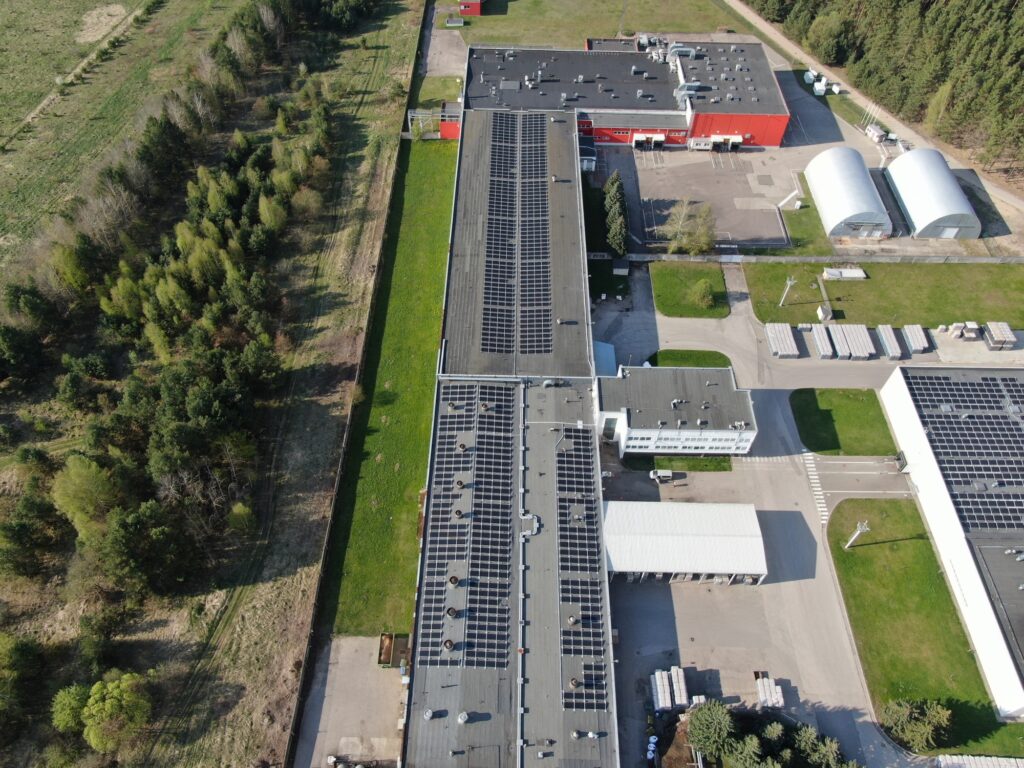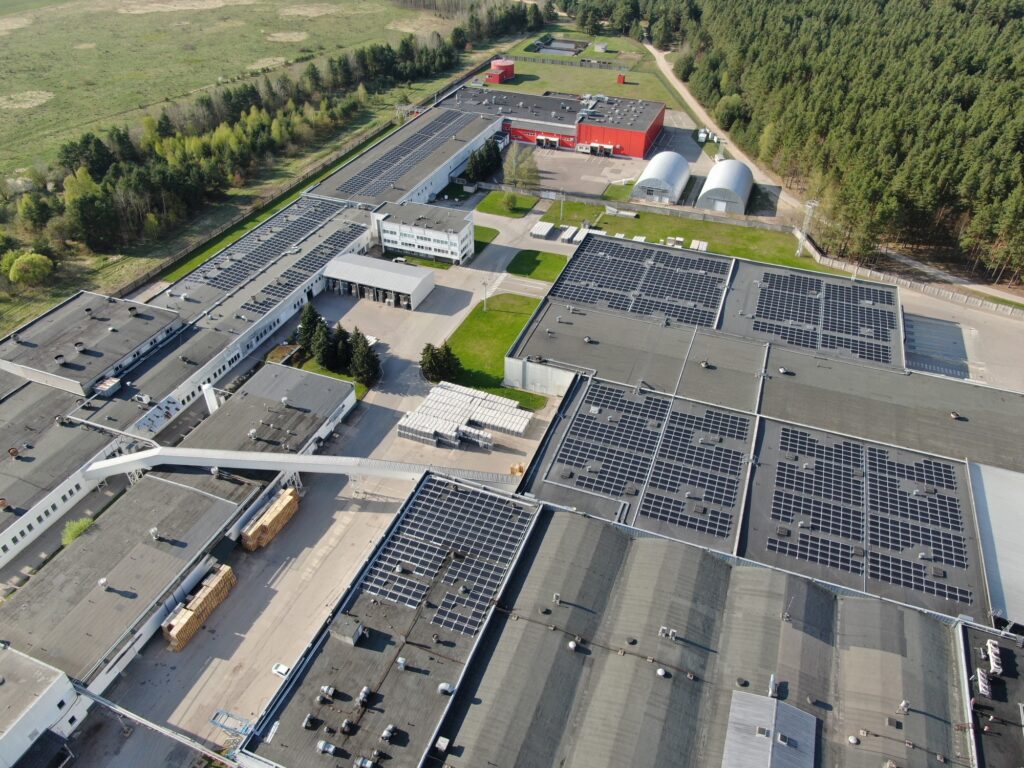Roofs of Alita and Anykščių vynas factories turned into powerful solar power plants
Lithuanian beverage factories in Anykščiai and Alytus have started generating their own green energy this summer and increased their sustainability. State-of-the-art equipment has been installed on the roofs of the buildings and a number of modules have been connected to convert the sun’s rays into electricity.
“The most impressive view is when we can see the roofs of the factories from above. We use thousands of square meters to capture the sun’s rays and convert them into sustainable electricity. In doing so, we are strengthening our tradition of respecting nature and using resources sustainably. Solar power plants will help us to reduce operating costs and better manage risks when electricity prices fluctuate sharply on the market. By being able to use an alternative and renewable source of energy, we are strengthening our independence from external factors,” says Algirdas Čiburys, CEO of MV GROUP Production, which manages the Anykščių vynas and Alita beverage plants.
According to the company’s data, more than 11,000 square meters of roof space has been used to install solar power modules at the Alita plant. The roof area of the Anykščių Vynas plant was 8,600 sq m. This area is equivalent to the size of two and a half conventional football pitches (7,800 sqm).
More than €1.4 million investment
1 megawatt (MW) of solar power installed and commissioned in Alytus and 760 kilowatts (kW) of solar power installed at the Anykščiai plant. The energy generated will meet part of the demand, while the company will continue to buy the rest from its supplier, having already opted for 100% green electricity a few years ago.
Reenpro, the company responsible for installing the solar power plants, has installed some of the most efficient solar modules and other equipment that should last at least 30 years. The plants have become modern generating consumers and are able to transmit instantaneous surplus electricity to the ESO grid.
“For the first time, we used an innovative solution to install a solar power plant in Alita – the Eyecatcher Solarfix anchor system glued onto a flat bitumen roof, which avoided any intervention in the roof. According to the tests carried out, the system can withstand a vertical lifting force of 1.85 kN. Both projects have been carried out using SunPower modules, which are still ranked number one in the global Tier-1 solar module supplier evaluation list. The projects use extremely high-quality equipment to guarantee the efficient operation of the solar power plant for many years,” said Danis Jarušas, CEO of Reenpro.
The solar power plant on the roofs of Alita’s buildings is expected to generate one third of the plant’s annual electricity consumption. And the power plant on the roofs of Anykščiai Vynas’ buildings could generate up to two-thirds of the plant’s annual electricity consumption. According to Mr Čiburys, the investment of more than EUR 1.4 million should pay for itself in 6-7 years, and even in 3-4 years if electricity prices rise.
Solar power plants – part of a big goal
The location of solar power plants is no accident. According to A. Čiburys, Head of MV GROUP Production, rooftop modules make better use of existing assets by preserving vacant land that can be used in the future for green areas, parks or the expansion of production activities, warehouses, etc.
“The two solar power plants are an important milestone in our sustainability journey. We are convinced that industry and business can make a significant contribution to tackling climate change. It is therefore very important for us to consistently improve in this area and to achieve long-term goals such as 100% renewable energy, achieving as close to neutral CO2 emissions as possible, and making our operations climate-neutral,” says the CEO of MV GROUP Production.
He is convinced that through innovative solutions, business can protect the country’s greatest assets – Lithuania’s natural environment, clean air and water – and allow factories to sustainably continue their old manufacturing traditions.
Sustainability is enhanced by energy saving solutions
MV GROUP Production Manager A. Čiburys points out that the green changes consistently implemented in factories include not only energy production from renewable sources. Equally important is the area of energy efficiency solutions.
“Digitalization, automation and robotics are not magic words for us. They are our reality and the way forward. Systematic strategic changes make our employees’ jobs easier and better, improve productivity, and help conserve energy and other resources. We track a wide range of indicators that confirm that our modernization solutions are paying off: from upgrading lighting systems to new heat and cold generation (energy) systems. A computerized monitoring system helps us understand how much energy can still be saved, so we can better manage our production costs and be globally competitive in showcasing Lithuanian products,” concludes A. Čiburys.
Along with Alita and Anykščių Vynas, MV GROUP Production also owns the Stumbras and Gubernija beverage plants. MV GROUP Production is managed by MV GROUP, one of the largest groups of companies in the Baltic States, which links together companies engaged in the production of alcoholic beverages and other beverages as well as in wholesale and retail trade and logistics in Lithuania, Latvia, Estonia and Poland.
Gubernija Announces National Movement Savi už savus: Invites to Cope with the Consequences of the Economic Crisis Together

Mineraliniai vandenys, celebrating its 30th anniversary, changes its name

Alita, celebrating its 60th anniversary, congratulates Alytus and invites to become a part of the unique Lithuanian record





